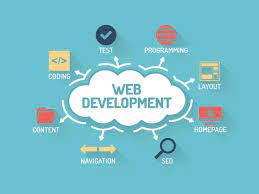
Web Development Services in India - In 2023, the landscape of website development has evolved significantly, with numerous online platforms vying for the title of the "best" option. The choice of platform often depends on factors such as the project's complexity, the developer's skill set, the desired features, and the overall goals of the website. While there isn't a one-size-fits-all answer, several platforms have stood out due to their innovation, user-friendliness, and robust feature sets.
- Webflow: Webflow has gained substantial popularity due to its unique combination of design and development capabilities. It offers a visual interface for building websites while also allowing access to the underlying code for customization. With its responsive design features, Webflow enables developers to create websites that function seamlessly across different devices. Its CMS functionality is also a strong point, making it a suitable choice for content-rich sites.
- WordPress: WordPress continues to be a dominant force in the website development landscape. It's renowned for its flexibility, extensive plugin ecosystem, and user-friendly content management system. In recent years, WordPress has embraced modern web development practices, offering block-based editing through the Gutenberg editor. This has streamlined the process of creating dynamic and visually appealing websites without extensive coding knowledge.
- Wix: Wix remains a popular choice for beginners and small businesses due to its drag-and-drop interface. It's a fully hosted platform, providing an integrated environment for website building, hosting, and domain management. While it might not offer the same level of customization as some other platforms, it compensates with ease of use and a wide range of templates and apps.
- Shopify: For e-commerce development, Shopify continues to lead the way. It provides a comprehensive solution for building online stores, from product management to payment processing. Shopify's extensive theme collection and app store offer flexibility and scalability, making it suitable for both small businesses and enterprise-level operations.
- Squarespace: Squarespace is renowned for its visually appealing templates and design-oriented approach. It's an excellent choice for artists, photographers, and creative professionals who want to showcase their work in an elegant manner. Squarespace combines website building with blogging and e-commerce features, making it versatile for various types of websites.
- WooCommerce: While not a standalone platform, WooCommerce is a powerful plugin for WordPress that transforms it into a full-fledged e-commerce solution. With its extensive range of extensions and themes, WooCommerce offers remarkable flexibility for creating online stores tailored to specific needs.
- Drupal: For more complex and feature-rich websites, Drupal remains a strong contender. It's known for its robustness and scalability, making it suitable for large enterprises, government agencies, and organizations with intricate website requirements. While it may have a steeper learning curve compared to some other platforms, it offers unparalleled customization and control.
- Joomla: Joomla strikes a balance between ease of use and advanced features, making it a suitable choice for mid-sized businesses and organizations. It offers a strong community and a variety of extensions that enhance its functionality.
- Ghost: Ghost is a platform specifically designed for bloggers and publications. It focuses on providing a clean and distraction-free writing experience, while also offering modern publishing tools. Ghost's simplicity and focus on content make it a favorite among writers.
- Netlify: Netlify has gained attention for its hosting and deployment capabilities. It excels in providing an efficient workflow for developers through features like continuous deployment and server less functions. With its JAMstack approach, Netlify is a great choice for modern, performant websites.
In conclusion, the "best" online platform for website development in 2023 depends on your specific needs and goals. Each platform mentioned here has its own strengths and target audience. Beginners might gravitate towards platforms like Wix or WordPress, while developers looking for more control might opt for Webflow, Drupal, or others. E-commerce projects can benefit from Shopify or WooCommerce, while content-focused sites could thrive on Squarespace or Ghost. Ultimately, the right choice hinges on understanding your project requirements, technical proficiency, and design preferences.

































